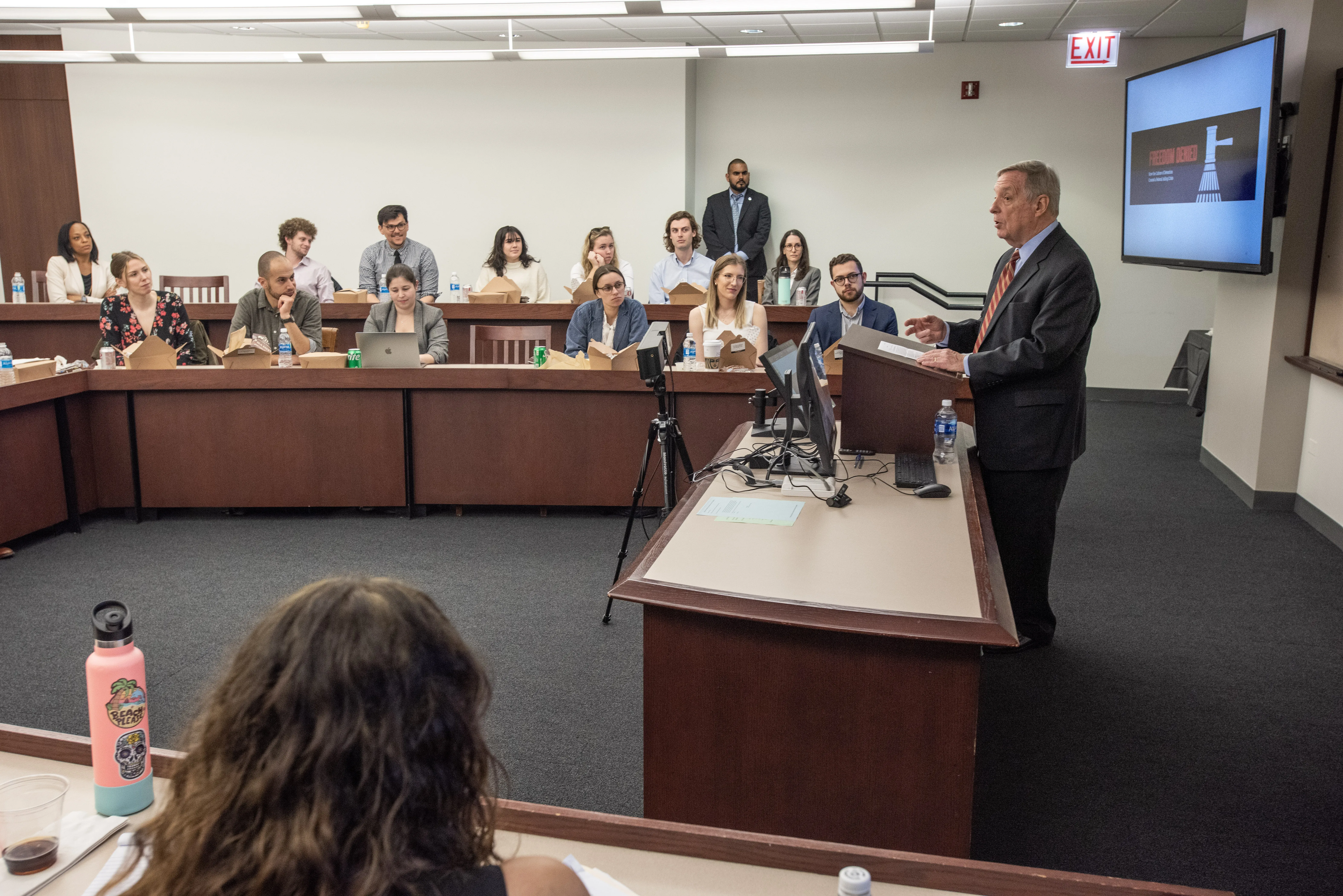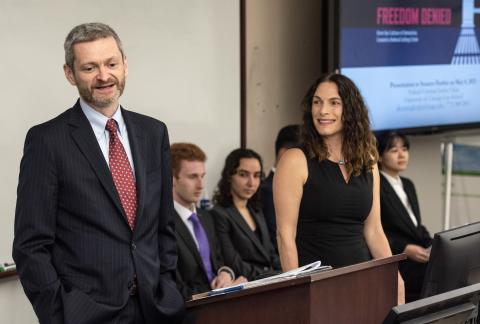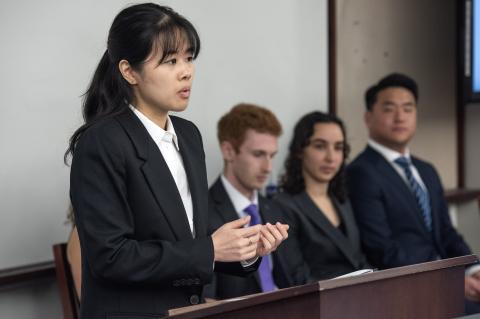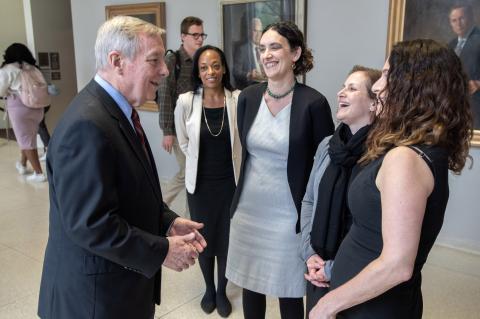Senator Durbin Visits Federal Criminal Justice Clinic

In early December, the University of Chicago Law School’s Federal Criminal Justice Clinic (FCJC) released the first national investigation of federal pretrial detention, a groundbreaking study, which identified a “federal jailing crisis” that disproportionately impacts poor people of color. In March, US Senator Dick Durbin (D-Illinois), chair of the Senate Judiciary Committee, re-introduced legislation that Alison Siegler, Clinical Professor of Law and Founding Director of the FCJC, says would “entirely eliminate the presumption of detention in federal drug cases and immediately and dramatically reduce federal jailing rates across the country.”
In May, Siegler, clinic students, and Durbin—among the nation’s leading advocates for bail reform—came together at the Law School to discuss a broad range of topics aimed at ensuring a fair system of justice for all. Durbin was welcomed back to the Law School by Thomas J. Miles, Dean and the Clifton R. Musser Professor of Law, who cited the “extraordinary work” of FCJC students and faculty. Siegler spoke about the urgent need for legislative solutions to reform the “culture of detention,” where federal judges routinely violate the very bail laws that they are tasked with upholding, driving up detention rates, jailing people for poverty, and exacerbating racial disparities. The result inflicts lasting harm on families, communities, and society.
The FCJC’s report, Freedom Denied: How the Culture of Detention Created a Federal Jailing Crisis, Siegler noted, is the latest in a years-long series of FCJC efforts at the judicial, legislative and executive levels to bring federal pretrial detention practices back in line with the Bail Reform Act’s requirements. Freedom Denied builds on a pilot federal court-watching study in Chicago in 2018–2019 conducted by Siegler and Erica Zunkel, Clinical Professor of Law and Associate Director of the FCJC. This clinic project has included testimony before the House Judiciary Committee, a discussion with President Biden’s Transition Team, and conversations with the leadership of the Department of Justice’s Access to Justice office. Siegler and FCJC students have trained hundreds of federal judges, hundreds of probation officers, and thousands of federal public defenders. Judith Miller, Clinical Professor of Law, has been working with FCJC students to develop litigation that challenges the culture of detention.
Siegler thanked Durbin for his recent reintroduction of the Smarter Pretrial Detention for Drug Charges Act of 2023. “Our report confirms the need for the legislative reform you are spearheading,” she said. “By entirely eliminating the presumption of detention in federal drug cases, your bill would immediately and dramatically reduce federal jailing rates across the country.” Durbin’s bill “not only safeguards the fundamental right to liberty, but would also improve public safety and significantly reduce racial disparities.”
Clinic students Jaden Lessnick, ’23, Georgia Huang, ’24, Michael Jeung, ’24, and Katja Stroke-Adolphe, ’25, shared the report’s key findings, drawn from 600 bail hearings across four federal district courts in Boston, Baltimore, Miami, and Salt Lake City, as well as interviews with nearly 50 federal judges and practitioners.
FCJC students discussed the four key findings of Freedom Denied—findings that support the case for Durbin’s bill and other reforms.
- At detention hearings, judges regularly misapply the presumption of detention in a way that increases jailing rates and intensifies racial disparities.
- Judges in some courts unlawfully jail people without lawyers at the first bail hearing; in approximately one quarter of federal district courts, judges do not ensure that every person is represented by counsel at their initial appearance hearing.
- Judges at times jail people in violation of the law at the initial appearance hearing.
- Judges in some courts detain people on unlawful money bail, locking people in jail because they are too poor to pay for their freedom.
“We discovered that all of these problems disproportionately impact people of color,” Siegler said.
In his discussion, Durbin called the students’ presentation “informative and inspiring.” He recounted his decades of work on criminal justice reform and his push to appoint more diverse judges to the federal courts. He spoke of the transformative experience of visiting those who are incarcerated and urged every member of Congress to visit a prison.
Given the polarization in Congress, Durbin said the immediate path ahead for his legislation is challenging. But he pledged to push forward. “It was a pleasure to meet with faculty and students at FCJC today,” Durbin said. “As we continue to reform our criminal justice system to prioritize rehabilitation over retribution through evidence-based practices, it’s crucial that the research and mentorship of legal clinics like FCJC continue to have the support and resources that they need. I remain committed to reducing our system’s overreliance on incarceration, mitigating the tragic racial disparities plaguing the system, and protecting the civil rights of all Americans, including people in custody. Thank you to Professor Siegler, Dean Miles, [Assistant] Vice President [for Urban Affairs, Alaina] Beverly, and all of the aspiring attorneys for the opportunity to join you today.”





